A Change of Pace, James 1:19-21
Discussion & Practice
We’re learning about how genuine faith works. It produces a whole new life from the inside out. It generates a whole new existence both now and forever.
When you have faith in Christ and give your life to him and enter into a relationship, it’s not just about going to a new place when you die. You start changing now with new desires, hopes, and values.

We have a divine origin and a divine destiny. We have a new operating system that replaces the old one and a radically new way of doing life.

James wants us to be clear on this.
It’s really important to know that James is talking about a new operating system. This is what he says about that new operating system. This is what changes on the inside. You become quick to hear, slow to speak, and slow to become angry.
We normally understand this as meaning be wise in relational advice. It works in that way but is far more than that.

With this new operating system, there’s a change of pace in your life. Some things slow down and some speed up. You have new gears. Your life in Christ changes the rate of speed by which you operate. You’re drawing from a different power source.
You could use the analogy of the difference between gas and electric vehicles. The gas in this image could represent the sinful life and the electric could represent this quieter life.
My son has an electric car. It was the first time I had ever been in one when I drove it. I couldn’t seem to turn it on. It was so quiet that you didn’t feel anything at all. James is saying your life quiets down.
James is very much like a production supervisor. He’s in the glass office upstairs looking over the plant and making sure the quality and quantity is good. That’s how James is looking at faith is like a production supervisor. Faith isn’t a possession you set aside. Everything changes.
There’s a story where a football flies over a fence and lands in a henhouse. They are startled and gather around. It’s quiet. The rooster hears all the commotion and comes to look at the football. He says, “Ladies, it’s time to take a hard look at what they’re producing on the other side of that fence.” That’s what James is doing. He’s saying this is not that. It’s different.
The old life runs on a kind of fuel. Anger fuels the old life. Sin and death. You get get revved up and power up. It’s laced with self-importance and self-assertion. And it’s called upon by us and relied upon to get what we want in the world. Anytime you are frustrated or what you want gets blocked somehow, anger becomes the energy we operate with to make life work for us.
At the very core of human behavior, anger is one of the core resources for a life that creates destruction. It accounts for an enormous amount of evil and harm. It is the first sin recorded outside the garden. It’s the first thing God deals with and elaborates on, because what do you do outside the garden when you don’t get your way?
You get undermined, cheated, forgotten, passed over, shorted. So Cain feels that way and murders his brother. Jesus said anger and murder are on the same continuum. There are no murders that anger didn’t start. It’s the fuel for sin and the death engine.
In 1 John 3, John says we should not be like Cain.
James is describing a relational massacre when he writes about the quarrels and fights happening among you. You desire and don’t have, so you murder. It’s a communal massacre of anger because you don’t get what you want. It’s very powerful and very damaging, even second-hand. Anytime you see anger, it makes you nervous. Just knowing someone is mad at you is hard to handle. We manipulate people with our anger. It’s powerful. We control, demand, and manipulate with it.
How else do you get what you want? It’s a way of taking charge of your life, and for some of us, it’s all we know. Some of us are addicted to the feeling of anger.
Dallas Willard says in The Divine Conspiracy, “Anger embraced is, accordingly, inherently disintegrative of human personality and life. It does not have to be specifically ‘acted out’ to poison the world. Because of what it is, and the way it seizes upon the body and its environment just by being there, it cannot be hidden. All our mental and emotional resources are marshaled to nurture and tend the anger, and our body throbs with it. Energy is dedicated to keeping the anger alive: we constantly remind ourselves of how wrongly we have been treated. And when it is allowed to govern our actions, of course, its evil is quickly multiplied in heart-rending consequences and in the replication of anger and rage in the hearts and bodies of everyone it touches.”
Usually, your anger creates more anger.
When Christ comes into your life, you learn that anger is not in harmony with God’s purposes.
It does not “produce” the righteousness of God. It doesn’t produce his way of doing or seeing things.
When the new operating system comes in, anger has to be reduced. What is essentially happening is that your expectations in life get tempered. It’s not all about what you want or what you can get. Your ego starts to shrink so that you’re not the most important person in your thoughts. People become valuable to you so that you don’t want to hurt them. Those are the new gears that create the change of pace. The mouth slows down and your listening speeds up.
James is going to say a lot about the tongue.
I went through James and highlighted everything James says about the tongue or speaking. That was an interesting thing that made me ask what he’s saying. He’s ultimately saying two things: The danger and deception that the tongue creates.

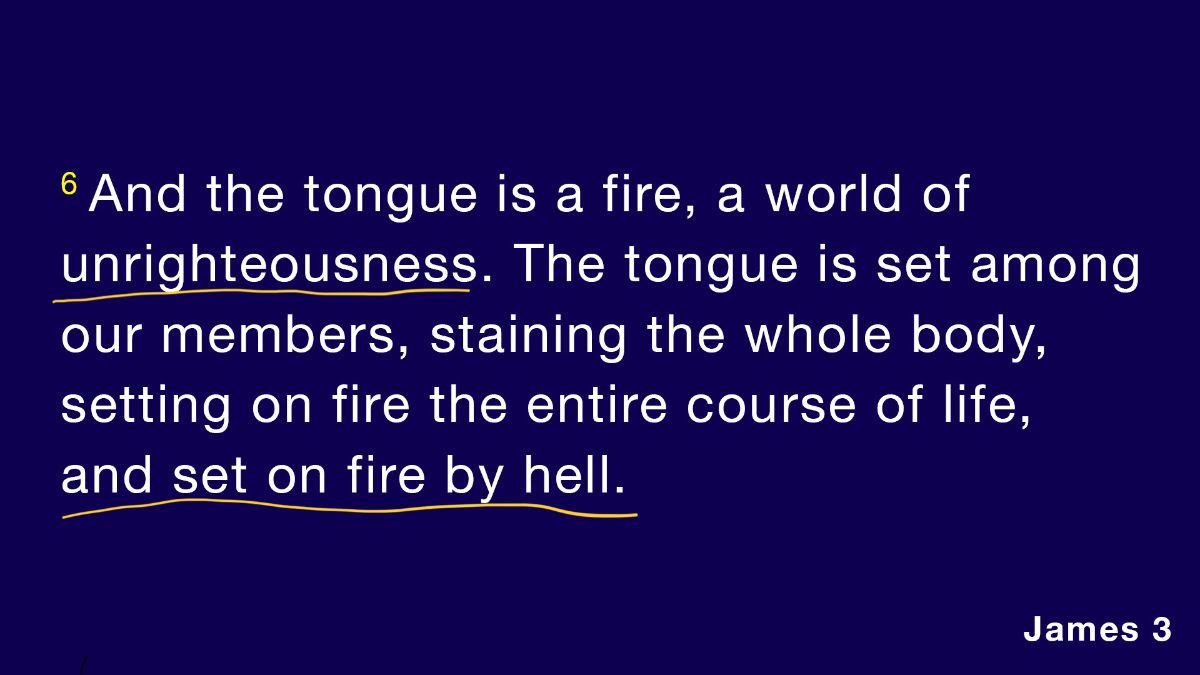
I made a list of every negative thing the tongue does and a list of everything good the tongue does.

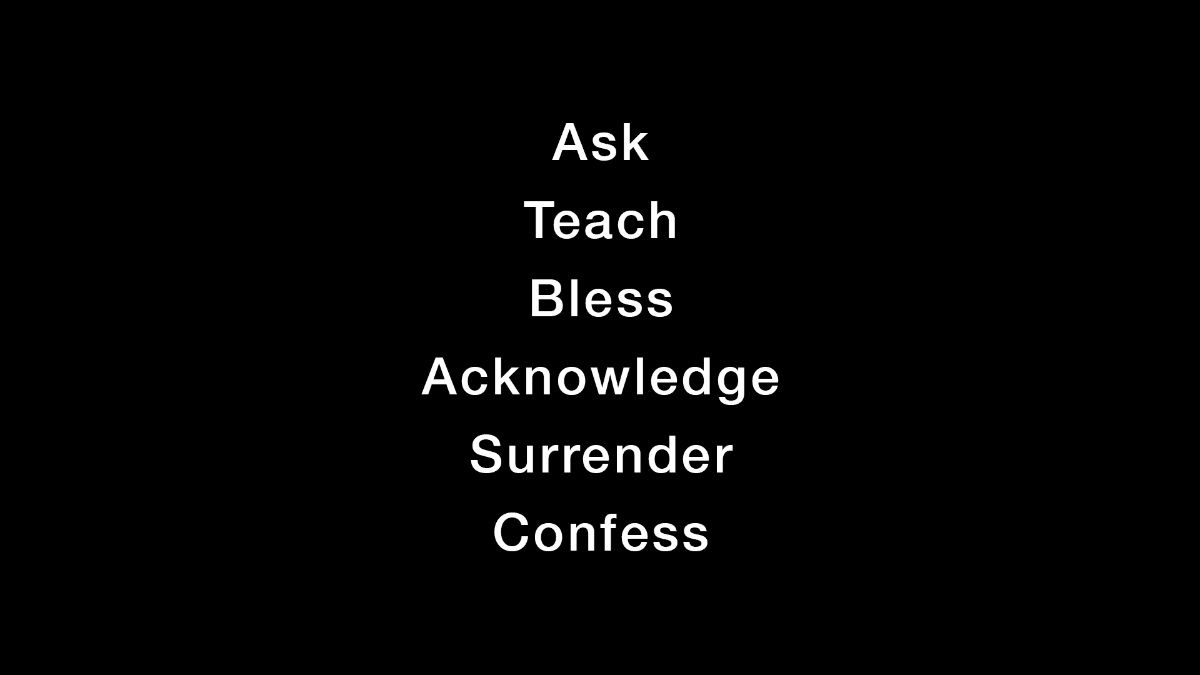
Just by virtue of this list, there’s less going on with the positive side. James is saying we’ve got to power down the destructive process. There’s less yak-yak when you come to faith.
The other thing the tongue does is covers up false faith.
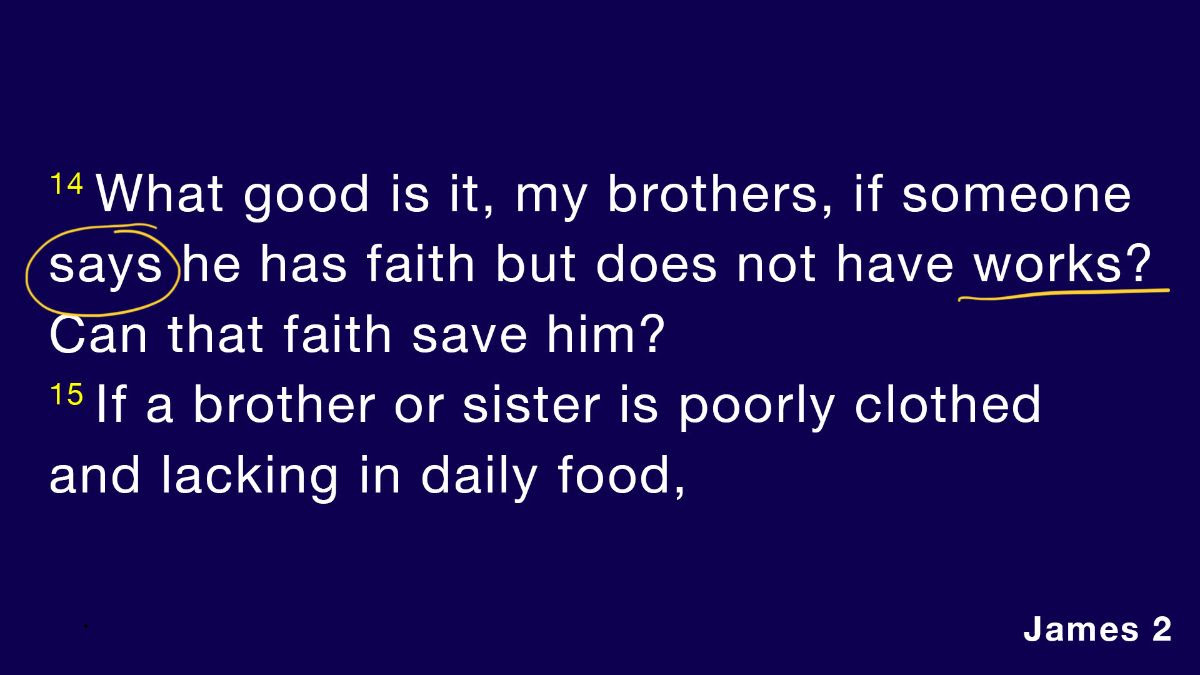
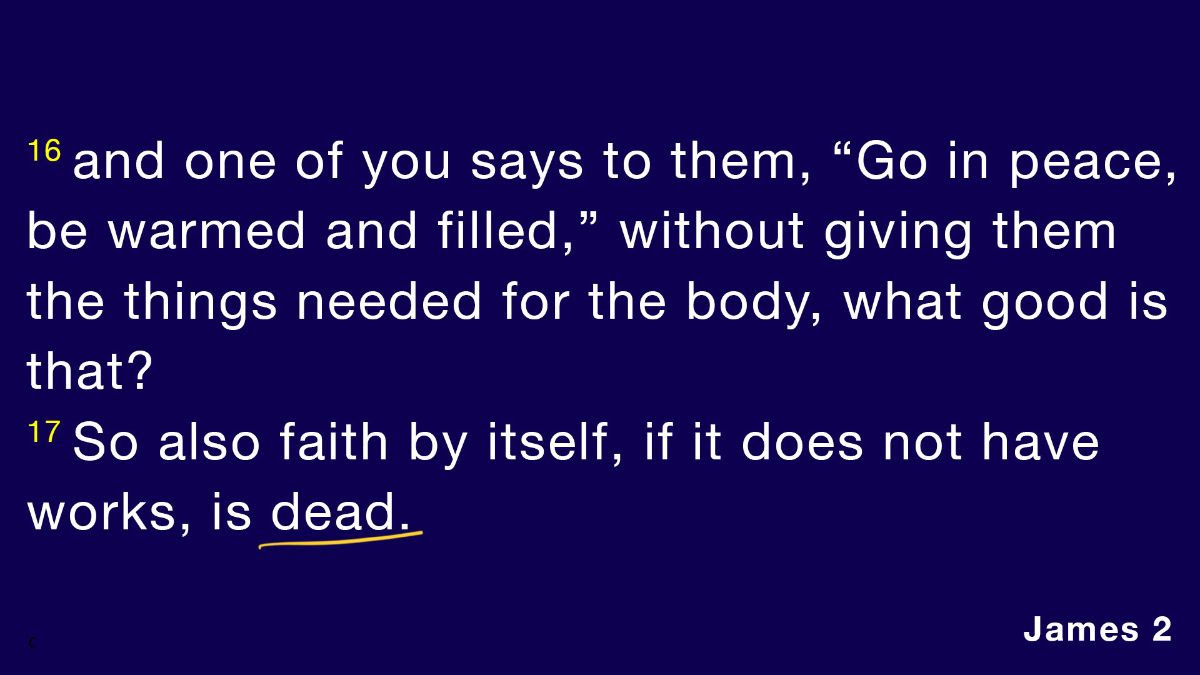
James is saying it doesn’t do any good to do all this talking without doing any works. James says we talk a better game than we play. It’s easy to sound far more spiritual than you are. It’s really just a cover for inactive faith that doesn’t want to do anything.
James is not talking about amount of speaking. He’s not just saying speak less. Though that can save you from saying something stupid. But he’s not saying to cut down your speaking. He’s saying anger can’t drive our mouth and we’re apt to saying other things instead of doing damage. It’s a posture and orientation. James says the tongue is like a rudder on a ship that guides the whole ship. Your running mouth is running your life. With a new operating system, it’s not running your life anymore. You’re not chasing after the same things, so there’s less to demand or criticize. There’s less damage to do.
You ever say to somebody, will you just shut up and listen?
This works relationally, but that’s not the primary application. You’re operating in a whole new way trying to produce the righteousness of God. You’re not trying to get the same things out of life.
Obviously with less talking you hear better. You can’t hear over yourself.
You’re listening for what God wants. As you grow as a believer, you should do that faster. That’s the change of pace.
We’re going to learn more about the hearing side.
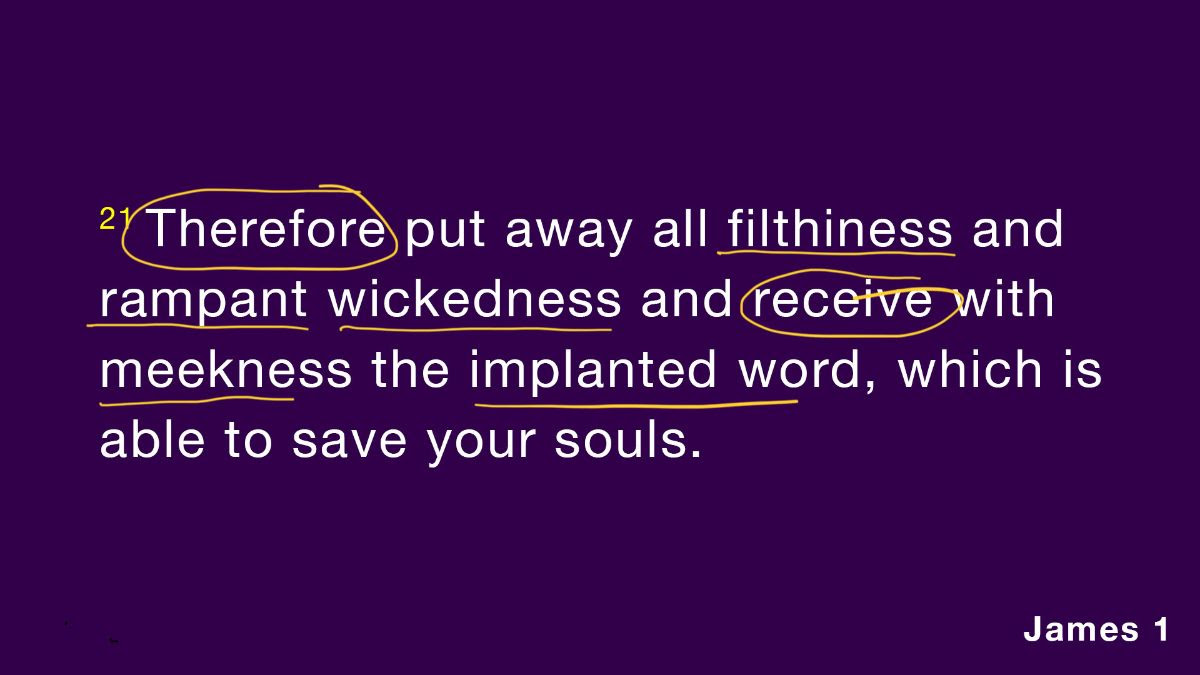
The whole spiritual life comes from above as something you receive. It takes some meekness on our part.
By God’s own will, he’s implanted the gospel in us. It’s able to save our souls. This is one of the most beautiful ways to describe the spiritual life.
James changes metaphors to clothing. When anger doesn’t dominate your life, a lot of filth goes away. You don’t like all the filthy things you used to do. James says to put it off like you would dirty clothes.
The word for “rampant” means abundant or surplus. No matter how much you grow, you always have this little “sin survival kit” for when you feel like God hasn’t come through for you. James is saying God even wants your sin survival kits out. All your fallback habits and old schemes you used to use to get your way.
You should be less comfortable with sin in your life.
God makes this life available to us. God has already implanted the word inside of us. Now you have to receive it. You welcome it into your world, into your life. You’re hospitable to it. You’re happy and receptive to it. It’s able to continually save your soul and constantly producing salvation in you. You’ve never just saved. You’re always being saved and will ultimately one day be saved.
And you become a better host to what God says, slowly over time. How much of a better host are you to the things God wants to do in your life? Are you a better host or hostess? Are you more hospitable to what he wants?
First application would be, do you hear yourself? Do you talk over God, always spitting out what you’re doing, what has happened, what should happen? Does your voice run your life instead of his?
Excuses, plans without praying, interrupting, bad-mouthing, dictating, demanding. What are we saying? Does it really match what we’re doing? If you give any thought to that, it will slow your pace for sure.
I had the thought this week that if we were really serious about this, we would wake up every day and say, God, slow my mouth. That would be our first prayer.
If this is new to you, and you’re hearing the gospel of Jesus’ death, burial, and resurrection, and you can’t save yourself, even with your most sincere thought, you can’t save yourself. That’s a hard message. People are quick to speak and reject the message, and say God isn’t going to tell me what to do or how it is. This is the refusal of the gospel. It’s upsetting to our pride and anger. We become defiant, maybe passive aggressive.
Romans 3:19 gives the most overwhelming description of how sin corrupts us and makes us enemies of God. When you hear the gospel and the truth hits you, every mouth is stopped and the whole world is accountable to God. It stuns you into silence.
His grace is a gift. Please hear his love for you.
Notes
- Read James 1:18-21. Focusing on verse 19, what is a way that God has changed your pace of living since you received his gift of life? In other words, what are some areas that have either quickened (like listening) or slowed down (like your speaking)?
- What are some examples of ways you've used anger to get what you want?
- What is your go-to response when you feel undermined, cheated, forgotten, passed over, or shorted? In what ways does anger affect people even when they're only observers and not the target of someone's wrath?
- What does it mean to "receive with meekness the implanted word, which is able to save your souls"? What does this posture look like in the very moment you're battling anger? 5. What does it look like in preparing for those kinds of moments that will come?
Practice: Think back over the last week and the times when you got really angry. What was at the root of the anger? Did you feel wronged by someone else? What value did you place on the other person in that moment? Maybe there is someone you need to reconcile with this week. What kind of humility or meekness would it take to do that? Try waking up every day this week praying, "God, slow my mouth today, and help me receive your word you've implanted in me." Then listen for his voice throughout the day.
From This Series
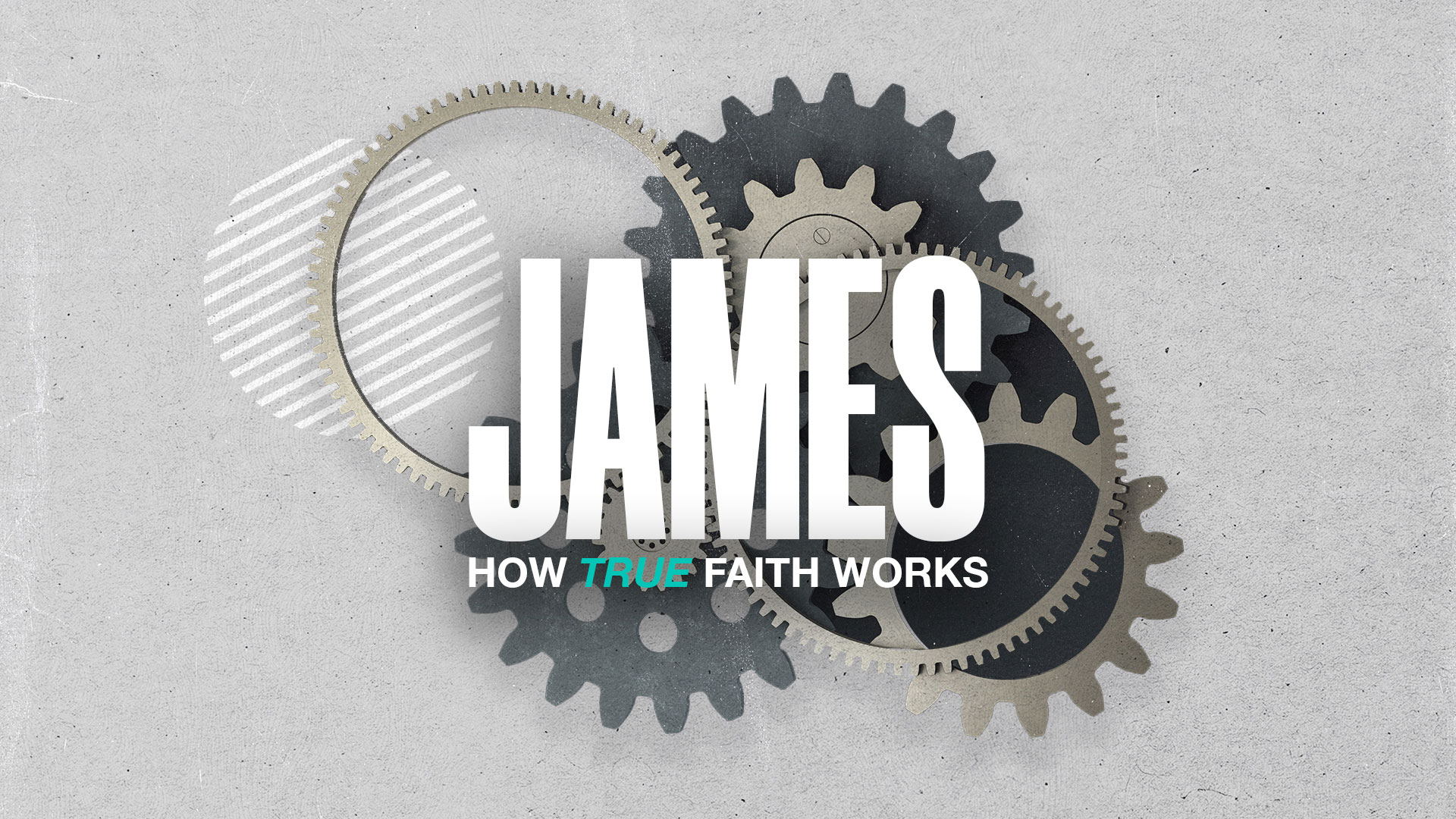
The Way Back, James 5:19-20

Make it Rain, James 5:13-18

Sin and Sickness, James 5:13-15

Straight Talk, James 5:12

Is It Possible...? James 5:11

X, Y, and Maybe Z? James 5:7-11

A Grumbling Grumble, James 5:9

Fix Your Heart, James 5:7-11

Suffering: A Framework, James 5:7-11

